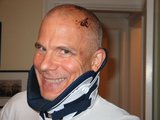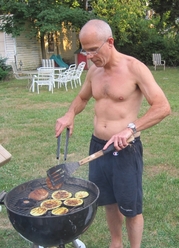On October 15, 2009, I participated in a nationwide campaign of nonviolent civil disobedience to demand Single Payer health care and an end to the profit-driven private health insurance system. Supported by some 50 legal protesters in the street, 14 protesters entered the lobby of One Penn Plaza in midtown Manhattan, a building that houses offices of the insurance giant UnitedHealth Group, and sat down on the floor. When we refused to leave, police arrested us and loaded us into paddy wagons.
Our group consisted six women and eight men. Of the men, two were in their mid-seventies; one of these was a retired Episcopalian priest, whose bearing and clerical color gave our group an air of respectability and gravitas; the other happened to be a Quaker.
Most people who do civil disobedience hope to get what is known as a Desk Appearance Ticket (DAT), where the police take you to the precinct, check your fingerprints for warrants, and if they find none, hand you a piece of paper like a traffic ticket and send you on your way. The whole process takes typically four to eight hours, and is perhaps only slightly more (or maybe less!) unpleasant than typical airline travel, where you are in a sense imprisoned, and your patience is tested. But we were not so fortunate. It was determined -- I don't know how or by whom -- that we were to go through "the system" with the rest of humanity in all its wretchedness. Some of us speculated that this determination may have been political, i.e., someone powerful made a phone call and said that protesters should be discouraged and not given any breaks.
First we were taken to the 9th Precinct, in the East Village, where we were divided by gender and kept in two cells for over 10 hours. For the first five or six hours, morale was high. We had lively and stimulating conversation, got to know one another, sang songs, had some good laughs. After seven or eight hours had elapsed and we still had not been provided water, much less food, we began to complain. Ironically enough, the priest had headed a commission some years ago that promulgated a set of reforms for the New York law enforcement and penal system. Among these was a regulation that any prisoner detained for over five hours between midnight and 7:00 a.m. had to be provided food and water. When the priest pointed this out to one of the officers, she argued that the rule applied only to Corrections and not the NYPD. The priest insisted that it wasn't so, and encouraged her to consult her supervisor. Eventually, she offered to take a few dollars from us, go to a vending machine in the building and bring some bottled water. I don't think it took much effort. Shortly thereafter one of the support team was allowed to send in a bag with refreshments: more water, some fruit and energy bars.
In the meantime, the police went through an arduous process of fingerprinting us one by one with a scanner that kept failing to recognize our fingerprints. Whether it was software or hardware that was defective, or both, the machine balked if your fingers were too oily, or not oily enough, or if you were simply too old and your prints were too faint. The cops muddled through with commendable patience for the several hours that it took to fingerprint all 14 of us.
It was approaching 10:00 pm when we were transported downtown to a place known as the Tombs, in the basement of the courthouse at 100 Center Street, too late to appear in night court and be released. The place was packed, and we all stood handcuffed in a slow-moving line for over an hour to be photographed one by one, and finally, around midnight, admitted as a group to one of several large holding cells.
Some of us were still wearing white T-shirts with black lettering that said "Victim of Private Health Insurance" on one side, and "Medicare For All" on the other. We were repeatedly asked by both police and prisoners why we were protesting, and we seized every such opportunity. People were overwhelmingly receptive. (Only the intake photographer at the Tombs was hostile, but then again, from what I was able to observe, he seemed to have hostile attitude towards everyone.) Thus the system handed us an opportunity to promote our cause and continue the very sort of work for which we were arrested.
The Tombs was not particularly pleasant. I was grateful not to have known in advance what it would be like, because if I had, I might have hesitated to get arrested. We were in a windowless rectangle with a built-in stainless steel bench along three walls (the fourth being the bars). There were a lot of miscellaneous arrestees, people sleeping on the floor or on the benches, overwhelmingly black. A group of kids, whom I found vaguely menacing, had apparently been arrested together for drugs; they monopolized one of the two phones. Shortly after we arrived, the guard announced a feeding and let us all out into the hall to collect little boxes of corn flakes and milk. When we returned to the cell there was a confrontation, basically about territorial boundaries. Another prisoner struck one of our group in the face, breaking his glasses and giving him a black eye. Another of our group yelled for the guards, who came promptly and removed both victim and assailant to different cells. This was how our evening at the Tombs began. (Note to those considering doing CD who have an aversion to violence: this incident could surely have been avoided had we exercised a bit more caution.)
A guard came to the bars to ask witnesses about the incident. A couple of us went over and provided a narrative. Then there was some grumbling in the cell about snitches, and I had some fears of getting my white ass beaten. But the whole affair seemed to blow over, and the hours dragged on.
And on. After so many hours under flourescent lights with no windows and little sleep, the time of day reported by my watch became a meaningless abstraction; there was no discernible difference between 4:30 a.m. or p.m. There was a water fountain in the cell, but I distrusted the foul-tasting water and drank sparingly. As for food, it's too painful to remember and I'd rather not talk about it. Seriously, though, the nourishment provided was evidently designed to keep us from starving and no more. For a good meal you should look elsewhere.
At some point, a handsome, well-dressed, articulate black man was brought into the cell. He and a like-minded friend began to lecture the assemblage about God, and His purpose for us all, and what we had to do to attain true manhood. "Gentlemen," he said, "there are four attributes that you do not find in a real man. A real man is not a gangsta, a pimp, a thug, or a playa." This seemed to be directed at the vaguely menacing kids. Eventually, there was a genuine conversation to which everyone who was not asleep appeared to pay attention, many of them participating. We discussed spiritual and philosophic issues and basic personal values. Where we could find common ground, we did so. When our well-dressed friend argued the inferiority of women, we called him on it. It was a remarkably fruitful exchange of ideas. But the preachers outlasted us, and the dialogue degenerated back into a one-sided lecture that became oppressive.
Our Episcopalian priest had been placed in a separate, more private cell -- presumably because of his age and status. Towards morning, they put him back in with the rest of us. His appearance apparently humbled the two lay preachers, as they finally quieted down as soon as this real clergyman arrived.
The morning wore on and became afternoon, according to my watch. At last the guards started pulling small subsets of us out to go to court, where a judge released us on our own recognizance. Mine was one of the last three bodies -- as we call humans in the judicial/corrections trade -- to be summoned. Our lawyer, a volunteer who enjoys representing protesters, stood up for us in court without having had a chance to talk to us beforehand. The prosecutor offered Defendant Yours Truly a plea to Trespass Violation, the lightweight version of the misdemeanor Criminal Trespass, and one day of community service. Community service? Excuse me, I have been serving the community big-time for the last 32 hours. For our septuagenarian Quaker, who has more of a track record than most of us, the offer was seven days in jail. Apparently he is deemed a danger to society and in need of some deterrence. Fuck that. The UnitedHealth 14 will be holding out for much more favorable dispositions.
My brief encounter with the system was sufficient to underscore what I already knew: we live in a profoundly racist society. There can be no justification for the extreme overrepresentation of minorities and the poor in the jail population. If patterns of law enforcement have a disproprortionate impact on non-whites, which they undoubtedly do, that is inexcusable; and if dark-skinned people in fact commit crimes at a greater rate than light-skinned people do, then they must be disproportionately affected by inequality and social problems that make it so, and which must be addressed. Most people would rather make a living wage than spend the night in the Tombs for shoplifting cosmetics from Walgreens.
The experience also reinforced my feelings of gratitude. I knew I was lucky to enjoy a bourgeois life, but after being released from the can, sleeping in a comfortable bed next to my warm and yummy wife, with the cat Master Lin-chi curled up purring next to my legs in all his astounding furriness -- this was delicious beyond description. I slept like a god.
When I awoke, the first thought in my head was this: Patients, not profits. Medicare for all. I realized my determination was now all the stronger.
* * *
Since you've been good enough to read all these words, you can now be rewarded with pictures and video. An excellent YouTube piece is at http://www.youtube.com/watch?v=3Vx_Cnw2Wxk, and there are still photos at http://www.antiauthoritarian.net/NLN/photo-gallery/2009_10_14_health/ -- scroll down past the silly HCAN stuff about the meaningless public option to see some great shots of the UnitedHealth action.
And yes, there is something you can do: http://healthcare-now.org/ The struggle is far from over and we have no intention of giving up.


